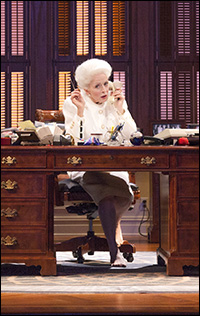
Directed by Mark Brokaw, and given a new book with a contemporary edge in humor, gender politics and politics-politics by Douglas Carter Beane, the Broadway debut of the lavish, TV-born musical was given mixed scores by the critical corps.
"Cinderella gets off to a halting start and takes some questionable detours," opined the Hollywood Reporter. "But this pleasurable confection overcomes its conceptual missteps with old-fashioned stagecraft, enchanting design elements, smooth direction and choreography, and most of all, winning contributions from an ideally-cast ensemble."
AP was fairly happy with the result, too, saying, "Beane has succeeded, proving he may be Cinderella's real fairy godmother. His script crackles with sweetness and freshness, combining a little Monty Python's Spamalot with some Les Miserables."
For Variety, however, Beane's touch muddied the waters. "The cheeky humor of Beane's book comes from imposing modern sensibilities (and contemporary lingo) on timeless storybook figures," the paper wrote. "But all these clever alterations radically change the story we all grew with, the tale about how true love rescues a callously mistreated girl from persecution. Because the evil stepmother and stepsisters are no longer cruel or threatening, our fairytale Cinderella is no longer a despised outcast, the unhappy victim of her sad circumstances. For that matter, Ella is no longer even the hero of her own fairytale."
New York magazine's good-and-bad appraisal typified the critical reception: "Beane's book is good-humored and well-tempered, and it stops just short of attempting too much. Why bother with a Chomsky exegesis here? Cinderella may not be an infinitely interpretable text — Beane's always on the razor's edge of ridiculousness — but every age is entitled to its own stock fantasies. Rodgers & Hammerstein's (and Beane's and Brokaw's) Cinderella is as solidly entertaining a commercial proposition as they come, featuring one of Broadway's finest ensembles and what might be its couple of the year: Just a couple of regular folks, the soul-searching blue-blood and the enchanted-orphan, trying to get along, and getting along rather well indeed." ***
 |
||
| Holland Taylor |
||
| photo by Ave Bonar |
Taylor has been touring with this piece — which she also wrote — for a couple of years. Somewhat unsurprisingly, since Taylor is well-liked and respected, and all journalists — theatre critics included — are liberal lapdogs who blindly honor the memory of left-leaning Richards (right, Fox News?), the critical notices were kind, if not exactly laudatory. The Daily News called it "an affectionate but uneven bio-drama." Said Backstage: "If the actor somewhat outshines the scribe, it's not a major problem. Taylor's witty, sharp-eyed script is sufficiently compelling to serve for this entertaining solo show."
"To put it as the plain-talking Richards might," wrote the Times, "this one-dynamo show — Ms. Taylor is the lone cast member — is neither a shapely work of drama nor a deeply probing character study. But admirers of Richards probably won't give a darn. She was a brightly shining political star and an inspiring figure during the years of her renown, and Ms. Taylor is essentially just giving this beloved dame one more chance to bask in the spotlight."
 |
||
| Bill Irwin and David Shiner |
||
| Photo by Gregory Costanzo |
Old Hats, the new clowning revue-with-music by Bill Irwin and David Shiner, added four weeks to its run at Off-Broadway's Signature Theatre Company after opening March 4 to high praise. The show also marked a rare sighting of the quirky and elusive musical artist Nellie McKay, who provides music.
Another midtown success was the Roundabout Theatre Company's new Off-Broadway revival of Lanford Wilson's gentle two-hander Talley's Folly, starring Danny Burstein — who has gone from success to success lately — and Sarah Paulson. Critical huzzahs led to a quick one-week extension to May 12.
The well-received revival of the Stephen Sondheim-James Lapine musical Passion at Classic Stage Company, which got good notices when it opened last week, was also extended for a week.
The Madrid, Liz Flahive's comedy at Manhattan Theatre Club, did not get great reviews when it opened last week. But it does have Edie Falco. So it's extending anyway, and for the second time, to May 5. Enough extensions for you? Good. Moving on…
***
The Kennedy Center for the Performing Arts has announced a rare revival of every musical theatre geek's red-headed stepchild of a musical, Henry Krieger and Bill Russell's Side Show. It will be directed by Academy Award winner Bill Condon, who is now charged with the singular duty of finding two actresses who look something like each other, and can act and sing, to play conjoined twins Violet and Daisy Hilton. The roles were created by Emily Skinner and Alice Ripley in the short-lived but much-loved (among certain folks) Broadway premiere. Both have gone on to fruitful, and very different, stage careers.
Side Show will run June 14-July 13 in the Eisenhower Theater.
***
Finally, who doesn't like to see drama critics fight with one another?
As if they didn't have enough things to be critical of, a few prominent stage reviewers decided to take time to rip into one another this week. John Lahr, who retired from regular reviewing last year after 20 years at The New Yorker, apparently has hours enough on his hands to think deeply about his former profession and colleagues. And he didn't like what he thunk. So he decided the world should know about his displeasure.
In a Nieman Reports essay called "The Illumination Business," he said, among many other things, "Discussion about theatre and the ideas of theatricals has all but dried up in the public arena. For both the artists and the audience, this is a demoralizing problem that diminishes both sides of the theatrical equation. In the American whispering gallery, most of the people dishing out judgment about plays these days have no working experience of the theatre, have never written a professional play or a sketch or even a joke, have never taken an acting class, or published any extended work of any kind. They are creative virgins. Everything they know about theatre is book-learned and secondhand. Most of what they have to say is cultural gas. These are the 'crickets.'"
Lahr also took pointed jabs at the work of the current working critics at the New York Times and New York magazine. He didn't have much of anything nice to say about any writer actually, lumping them all together under the damning umbrella term of "reviewer." Lahr considers himself a "critic." As he put it, "The critic is in the illumination business; the reviewer, by contrast, provides a consumer service."
This piece did not sit well with the working writers still out there regularly covering the theatre. One, Charles McNulty of the L.A. Times, posted a rebuttal on his Facebook page. "Lahr has become a nostalgia junkie," he wrote, "not seeing the limitations of writers, longing for his father's era. I like Lahr's notion about writing fewer but more substantial reviews, and of looking after the theatre rather than the audience. But Lahr's high-handed attack of other critics is unwarranted. There's no shortage of writing talent or sensibility among today's critics. There is a journalism challenge. And a cultural one. But the war isn't over. And I don't see any white flags on the horizon."
Just a few days after this tempest in a teapot, tempers flared over an essay on the late British theatre critic Kenneth Tynan written by Wall Street Journal critic Terry Teachout. In the piece, Teachout did the equivalent of poking his colleagues with a pointed stick — he criticized Tynan, a sacred idol in critical circles if there ever was one. Tynan "was a superficial thinker who donned ideas as if they were suits," "a moral idiot" who did a lot of "damage…by getting it wrong in so irresistibly quotable a way."
There was no official response this time, but the essay did inspire an angry Facebook post from Time Out New York critic David Cote, which in turn drew a slew of comments from other critics. A couple performers took part in the debate as well, including one who quipped, "Critics criticizing critics. Gonna pour me a drink and enjoy the show!"










